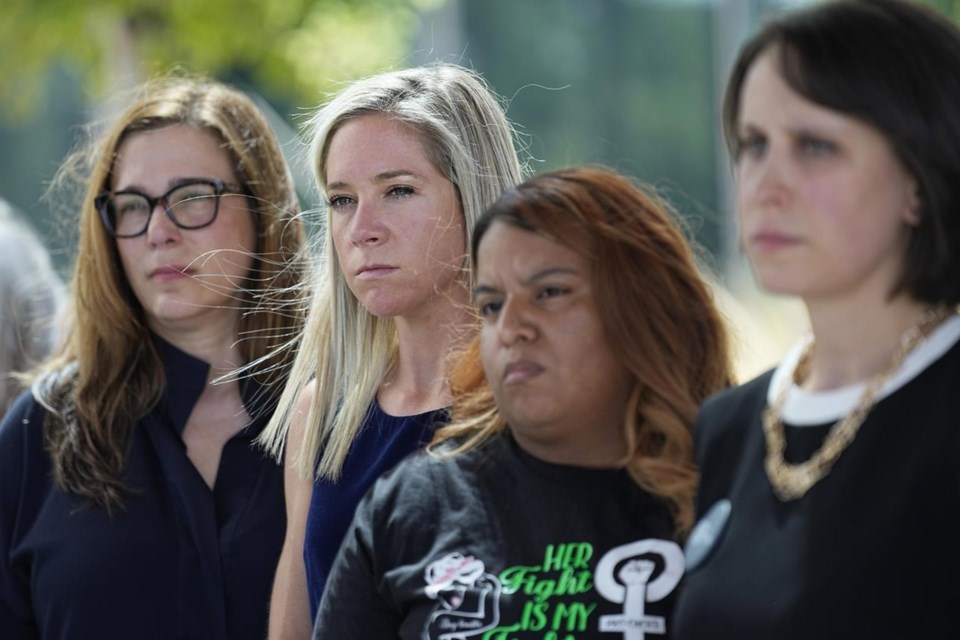AUSTIN, Texas (AP) — For the first time since Roe v. Wade was overturned, Texas women who were denied abortions testified in a court Wednesday of carrying babies they knew would not survive and continuing pregnancies that put their health in worsening danger.
Their detailed accounts in a crowded Austin courtroom were often emotional. At one point, the judge called a recess when a woman whose daughter died within hours of birth became ill and overcome on the witness stand.
“I survived sepsis and I don't think today was much less traumatic than that,” said Amanda Zurawksi, one of more than a dozen Texas women who are suing the state.
The lawsuit is among the numerous legal battles still flaring nationwide over abortion access more than a year after the U.S. Supreme Court overturned the constitutional right to abortion. What sets the Texas case apart, however, is that the women are believed to be the first in the U.S. to sue a state and testify over being denied abortion following newly enacted bans.
Their challenge does not seek to repeal Texas' abortion ban but to force more clarity on when exceptions are allowed under the law, which is one of the most restrictive in the U.S.
It is not clear how quickly state District Judge Jessica Mangrum will rule. The state is seeking to dismiss the lawsuit and a lawyer for the Texas attorney general's office called doctors' fears of being prosecuted baseless.
Under the law in Texas, doctors who perform abortions risk life in prison and fines of up to $100,000. Opponents say that has left some women with providers who are unwilling to even discuss terminating a pregnancy.
Amy Pletscher, an attorney for the state, said the lawsuit was brought by women and doctors who "simply do not like Texas’ restrictions on abortion.“
“The purpose of this court is not to legislate,” she said.
The lawsuit was filed in March, and since then, several of the women have spoken extensively to reporters and lawmakers about the catastrophic ends to their pregnancies. But Molly Duane, an attorney for the Center for Reproductive Rights that helped bring the lawsuit, said they believe Wednesday was the first time in decades that women who were denied abortions have testified in a court about a state's abortion ban.
Samantha Casiano testified she was halfway through her pregnancy when she found out during an appointment that her daughter had a rare diagnosis of anencephaly, where much of the skull and brain is missing. Doctors told her they could not provide her an abortion in Texas, and when a caseworker was called into the room, Casiano was handed funeral home information.
“I felt like I was abandoned," Casiano said. “I had this funeral home paper and this is just supposed to be a scan day.”
Although Texas' ban narrowly allows exceptions when the patient's life is in danger, opponents say the the law is so vaguely worded that doctors remain afraid to perform abortions even under those circumstances.
The proceedings were expected to continue through Thursday.
Sixteen states, including Texas, do not allow abortions when a fatal fetal anomaly is detected, while six do not allow exceptions for the mother’s health, according to an analysis by KFF, a health research organization.
The lawsuit in Texas comes as abortion restrictions elsewhere in the U.S. continue to face challenges. On Monday, an Iowa judge temporarily blocked the state’s new ban on most abortions after about six weeks of pregnancy, just days after Gov. Kim Reynolds signed the measure into law.
The majority of U.S. adults, including those living in states with the strictest limits on abortion, want it to be legal at least through the initial stages of pregnancy, according to a poll released in late June by The Associated Press-NORC Center for Public Affairs Research.
Paul J. Weber, The Associated Press



